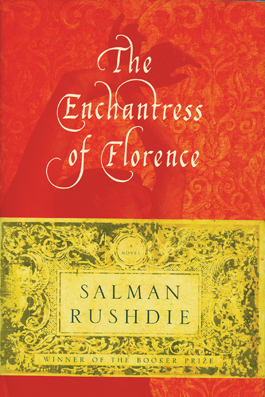home | metro santa cruz index | the arts | books | review

Photograph courtsey of Beowulf Sheehan/PEN American Center
Salman the Wise-Ass: Salman Rushdie's new novel, 'The Enchantress of Florence,' is a fantastical fable and a wry take on power.
Enchanted by Extravagance
Salman Rushdie makes a rare stop in Santa Cruz to stump for his new book, 'The Enchantress of Florence.'
By Traci Hukill
Seen in the rear-view mirror, the 1989 fatwa on Salman Rushdie was an early intimation of 9/11. Islamic extremism in the 1980s was a dark, incomprehensible thing, even less well understood than it is now, but if you just stayed home--didn't take a job in Tehran, didn't visit Beirut, didn't board an airplane in a major European city--you were basically OK. Rushdie taught us the error of that way of thinking. In fact, you weren't safe anywhere. An ayatollah could put a bounty on your head over an insult and in so doing mobilize an invisible global army united by a hankering to slit your throat. That they would come for you in your country, in your town, in your bed, was worse than scary. It was medieval. It was, as it was meant to be, terrifying.
Rushdie came out of hiding in 1998 when the Iranian moderates who succeeded Khomeini canceled state support for the edict (technically, the fatwa remains in effect). But the episode continues to define his public image. For one thing, it has helped establish him as one of the most political literary figures of our time, a distinction already warranted by his writing. His second novel and winner of the Booker Prize, 1981's Midnight's Children, was about the partition of his native country into modern India and Pakistan. His third novel, Shame, studied the troubled relationship between Pakistani leaders Zulfikar Ali Bhutto and Zia ul-Haq. Even his newest novel, The Enchantress of Florence, on its face a fabulous tale about the power of collective imagination to mold reality, revolves around the tension between repression and openness, political paranoia and trustfulness, Old World and New. This Tuesday, Rushdie makes a rare appearance in Santa Cruz to discuss his book with KUSP host and NPR book reviewer Rick Kleffel.
The Enchantress of Florence is not a book for readers determined to resist seduction. It's the 16th century, and a golden-haired, silver-tongued stranger has arrived in the capital of the Mogul Empire to seek an audience with Akbar the Great, a brooding, lonely ruler with modern secular leanings and a tendency toward self-doubt. The stranger's tale concerns his mother Qara Köz, a princess of Akbar's own royal family. First a spoil of war, then a creator of her own and others' destinies, she casts off the veil and travels the known world with her look-alike lady-in-waiting, enchanting shahs and princes and their people, leaving them when events turn sour. She enters the Florence of the Medicis with her warrior lover Argalia, who counts among his closest Florentine friends Niccolo Machiavelli, who's laboring over a book about how a prince might retain power, and Agostio Vespucci, cousin of the great explorer Amerigo. Hearing the tale, Akbar is smitten, and his fate becomes intertwined with an imaginary woman's.
The story of the stranger and that of the enchantress burst with beauty, textures, fragrances and sex. Rushdie deploys the magical realism with a free hand, but beneath it all is a foundation of cold hard reality. Machiavelli's advice to the craven Medicis might seem crass, but across the known world open-minded Akbar struggles with the same issues of trust and suspicion of his close advisers and even of his own sons. In fact Akbar, with his foibles, philosophical quandaries and glimmers of genuine nobility, is the real draw of this story, the most fully conceived and modern character in the book. In his vacillating between rage and melancholy it's possible to make out the outlines of a meditation on what it is to be human if you are in your own power.
This week is a big one for Rushdie: it's his 61st birthday and the first anniversary of his knighting. Soon will follow the first anniversary of his divorce from his supermodel fourth wife. In this dense, rich novel, Rushdie seems to be working out notions of fate and self-determination as much as of stricture and openness--and the question of what it means to be master of yourself.
SALMAN RUSHDIE discusses 'The Enchantress of Florence' with NPR book reviewer Rick Kleffel on Tuesday, June 17, at 7:30pm at the Rio Theatre, 1205 Soquel Ave., Santa Cruz. Tickets are $12 with purchase of book, $30 without, available at Capitola Book Café; 831.462.4415 or www.capitolabookcafe.com.
Send a letter to the editor about this story.
|
|
|
|
|
|